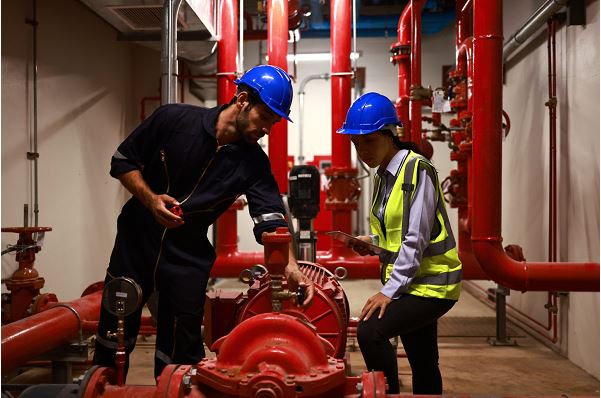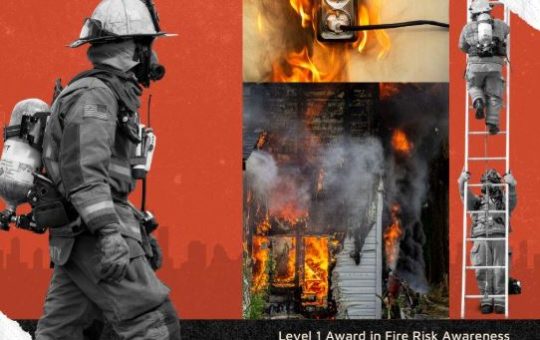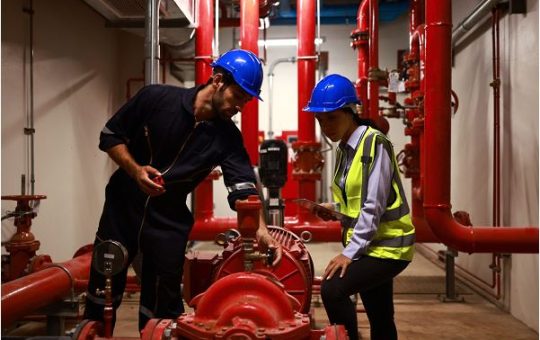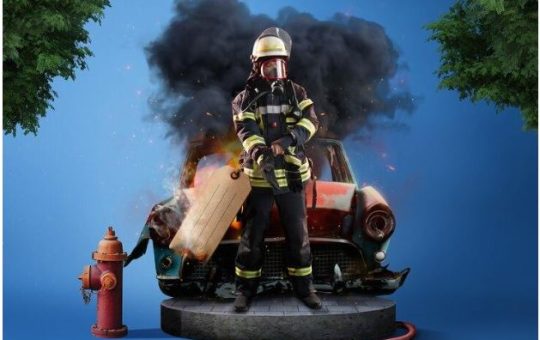
FIRE SAFETY LEVEL 3
Fire Safety Level 3 (Advanced) Course
Course Overview The Fire Safety Level 3 Advanced Course is tailored for professionals tasked with managing comprehensive fire safety strategies within organizations. This course provides in-depth training in fire safety management, risk mitigation, emergency planning, and incident investigation. It is ideal for senior safety officers, fire safety managers, and individuals looking to enhance their expertise and leadership in fire safety. With practical and theoretical components, this course equips learners to handle complex fire safety challenges in compliance with regulatory frameworks.Benefits⦁ Expert-Level Knowledge: Master advanced fire safety principles and methodologies. ⦁ Compliance Mastery: Ensure full adherence to international fire safety laws and standards. ⦁ Leadership Development: Gain the skills to lead fire safety teams and implement robust strategies. ⦁ Incident Management: Learn advanced techniques for fire investigation and reporting. ⦁ Career Growth: Open pathways to high-level roles in fire safety and risk management.
Learning Outcomes By completing the Fire Safety Level 3 course, participants will be able to:⦁ Develop and implement comprehensive fire safety management systems. ⦁ Conduct advanced fire risk assessments and recommend mitigation strategies. ⦁ Design and oversee large-scale evacuation plans for complex facilities. ⦁ Analyze fire incidents and prepare detailed investigative reports. ⦁ Lead training programs and workshops to promote a culture of fire safety. ⦁ Ensure organizational compliance with international fire safety regulations.
Career Progression The Fire Safety Level 3 course equips learners for senior roles and specialization in fire safety and risk management:- Job Roles: ⦁ Fire Safety Manager ⦁ Senior Health and Safety Consultant ⦁ Fire Risk Assessor
- Advanced Certifications: ⦁ NEBOSH Fire Safety and Risk Management ⦁ Certified Fire Protection Specialist (CFPS) ⦁ Advanced Incident Command Training
- Industries: ⦁ Oil and Gas ⦁ Manufacturing and Warehousing ⦁ High-Rise and Complex Building Management ⦁ Public Safety and Emergency Services
- Specialization Opportunities: Graduates can specialize in fire investigation, emergency planning, or industrial fire safety, leading to prestigious roles such as Fire Safety Director or Risk Management Consultant.
Study Units
The Fire Safety Level 3 Advanced Course consists of the following modules:
⦁ Advanced Fire Safety Management
⦁ Developing fire safety strategies for large-scale operations
⦁ Integrating fire safety into organizational risk management
⦁ Fire Risk Mitigation Techniques
⦁ Identifying high-risk areas in industrial and commercial settings
⦁ Implementing and evaluating fire prevention measures
⦁ Emergency Response Leadership
⦁ Managing fire emergencies and coordinating with emergency services
⦁ Leading emergency response teams during critical incidents
⦁ Incident Investigation and Reporting
⦁ Analyzing fire origins and progression
⦁ Preparing detailed reports and recommendations
⦁ Compliance and Regulatory Frameworks
⦁ In-depth study of fire safety legislation
⦁ Best practices for achieving regulatory compliance
⦁ Training and Awareness Programs
⦁ Designing and delivering fire safety training for employees
⦁ Promoting fire safety culture within organizations
Upon successful completion of this qualification, learners will be able to:
Develop Advanced Fire Safety Strategies: Design, implement, and manage comprehensive fire safety systems tailored to organizational needs.
Conduct Detailed Fire Risk Assessments: Identify complex hazards, evaluate potential impacts, and recommend practical mitigation controls.
Lead Fire Safety Programs: Supervise teams, allocate resources, and monitor performance of fire prevention initiatives.
Interpret and Apply Regulations: Demonstrate mastery of national and international fire safety legislation, standards, and compliance requirements.
Manage Emergency Situations: Coordinate large-scale evacuations and lead emergency response teams effectively under pressure.
Investigate Fire Incidents: Analyze fire origins, contributing factors, and prepare formal reports with actionable recommendations.
Integrate Fire Safety with Risk Management Systems: Align fire safety strategies with ISO-based management systems (e.g., ISO 45001, ISO 31000).
Design and Deliver Training Programs: Develop and implement organization-wide fire safety awareness and competency programs.
Advise on Policy and Governance: Provide expert input for developing organizational fire safety policies and continuous improvement frameworks.
Demonstrate Leadership and Communication Skills: Engage effectively with internal teams, contractors, and regulatory authorities to promote a strong safety culture.
The Fire Safety Level 3 (Advanced) Course is designed for professionals responsible for developing, managing, and leading comprehensive fire safety programs within organizations. It is particularly suited for individuals with prior experience or foundational knowledge in fire safety who are seeking to advance into senior or specialist positions. This course is ideal for:
Fire Safety Officers and Managers seeking advanced competence in fire safety management and risk assessment.
Health & Safety Professionals responsible for overseeing fire risk management within large or high-risk organizations.
Fire Risk Assessors and Consultants looking to enhance technical and investigative expertise.
Facility and Operations Managers tasked with ensuring full compliance with fire safety regulations.
Emergency Planning Coordinators responsible for developing and testing emergency response frameworks.
Government and Regulatory Officials involved in auditing and enforcing fire safety standards.
Professionals in High-Risk Industries such as oil and gas, manufacturing, construction, and logistics.
Our assessment process is designed to ensure every learner achieves the required level of knowledge, skills, and understanding outlined in each course unit.
Purpose of Assessment
Assessment helps measure how well a learner has met the learning outcomes. It ensures consistency, quality, and fairness across all learners.
What Learners Need to Do
Learners must provide clear evidence that shows they have met all the learning outcomes and assessment criteria for each unit. This evidence can take different forms depending on the course and type of learning.
Types of Acceptable Evidence
Assignments, reports, or projects
Worksheets or written tasks
Portfolios of practical work
Answers to oral or written questions
Test or exam papers
Understanding the Structure
Learning outcomes explain what learners should know, understand, or be able to do.
Assessment criteria set the standard learners must meet to achieve each learning outcome.
Assessment Guidelines
All assessment must be authentic, current, and relevant to the unit.
Evidence must match each assessment criterion clearly.
Plagiarism or copied work is not accepted.
All learners must complete assessments within the given timelines.
Where applicable, assessments may be reviewed or verified by internal or external quality assurers.
Full learning outcomes and assessment criteria for each qualification are available from page 8 of the course handbook.
Top Courses
No results found.
Related Courses
Let's Get in touch
Deleting Course Review
Course Access
This course is password protected. To access it please enter your password below:



